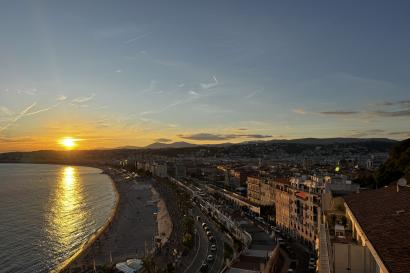Some of you may be like me—broadly speaking, sedentary, not the most physically active, and have arrived in your abroad location and find yourself being forced to be more active than you’re used to. It’s a struggle, and something that can be especially draining when you first arrive as your body adjusts not only to a new time zone but activity levels. Having been in Freiburg for almost a week now, I’ve found a few ways to cope with the changes.
- Acknowledge your limitations. I understand the FOMO, and the feeling that you are dragging down the group, or that you are the weakest link. I’ve been there, but generally your fellow IES Abroad students are understanding and will be willing to take a break to accommodate you. Besides, over time, your limitations will hopefully become less grating as time wears on and you adjust to the changes, meaning that in many cases they are temporary. If not—I understand the desire to take the risk, but I would place a premium on your own health first, not only for yourself, but for others as well.
- Medications: I personally hate taking medications, but in the midst of these changes they can be a good idea in order to smooth over the transition process. One of the most irritating issues I have come across in my hikes and walking across Freiburg is that my feet do not enjoy walking 10+ miles every day, and have begun to blister. Don’t worry, this is not something that will be long-lasting and eventually your feet will callous.
All you need to do is wash your feet (to avoid infection), and just grab some blister cream or an anti-blister stick (Compeed is probably one of the better ones), apply it to the affected area, and you’ll be fine. If it continues to be an issue, get some Orthopedic Insoles. I personally would not recommend using ibuprofen or a numbing cream for blisters, because if the blister gets worse you will need to stop to avoid an infection. Nevertheless, I will warn you that you need to be judicious in what you choose to take, since taking too much can be dangerous. Please, please please know your limits!
- Force yourself a little, even if you’re feeling a little sluggish and thinking more of your bed back in the dorm rather than the street in front of you. Focus instead on the future reward and that the pain and lethargy is less and less likely to present itself the next time you have to go out on the trail. The more active you are (in responsible bursts—don’t overexert yourself either!), the less painful it will be over time. If you want a very practical example of this, maybe get off the tram a little early and walk the rest of the way to the store, or walk up a steep incline occasionally rather than avoid them like the plague. Your legs will hate you for a little while, but it’s worth it.
- Take breaks: As someone who can be a little machista to himself, I sometimes tell myself that taking a break makes me “weak,” and push myself a little further than I otherwise should. However, my personal experience has illustrated that this is not only a bad idea, but can result in very serious consequences, such as a hospitalization. If you need a break, take one!
Take care of yourselves!
Thomas Matallana

Thomas Matallana
Buenas! My name is Thomas, and I am majoring in PoliSci & International Affairs. Very much excited to start learning about the EU in Freiburg this summer, as well as go beyond the Western Hemisphere for the first time. A good cook, and geopol nerd!








